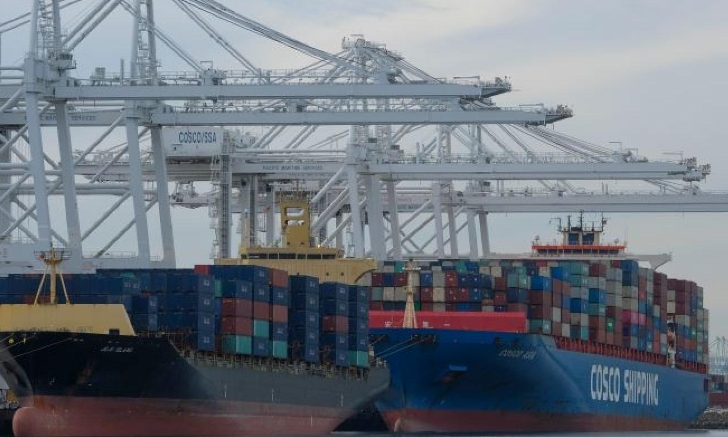根据我国相关法律法规和中华人民共和国海关总署与阿拉伯埃及共和国农业与土地开垦部有关埃及鲜食芒果输华植物检疫要求的规定,即日起,允许符合以下相关要求的埃及鲜食芒果进口。
一、检验检疫依据
(一)《中华人民共和国生物安全法》;
(二)《中华人民共和国进出境动植物检疫法》及其实施条例;
(三)《中华人民共和国食品安全法》及其实施条例;
(四)《进境水果检验检疫监督管理办法》;
(五)《中华人民共和国海关总署与阿拉伯埃及共和国农业与土地开垦部关于埃及鲜食芒果输华植物检疫要求合作谅解备忘录》。
二、允许进境商品名称
鲜食芒果(以下简称“芒果”),学名Mangifera indica,英文名Mango。
三、允许的产地
埃及芒果产区。
四、批准的果园、包装厂及检疫处理设施
输华鲜食芒果的果园、包装厂、冷藏库及热处理设施均应由阿拉伯埃及共和国农业和土地开垦部的中央植物检疫局(以下称“埃方”)审核备案,并由中华人民共和国海关总署(以下称“中方”)批准注册。注册信息包括名称、地址及注册号码,以便出口产品不符合相关规定时准确溯源。注册名单应在每年出口季节前,由埃方向中方提供。经中方审核批准后,中方将在官方网站公布该注册名单。
五、中方关注的检疫性有害生物名单
1.地中海实蝇Ceratitis capitata
2.桃实蝇Bactrocera zonata
3.橘绵粉虱Aleurothrixus floccosus
4.芒果轮盾蚧Aulacaspis tubercularis
5.无花果蜡蚧Ceroplastes rusci
6.黑丝盾蚧Ischnaspis longirostris
7.苍白牡蛎蚧Lepidosaphes pallidula
8.芒果蛎蚧Lepidosaphes tapleyi
9.扶桑绵粉蚧Phenacoccus solenopsis
10.无花果刺粉蚧Planococcus ficus
11.普里维尼亚盔蚧Saissetia privigna
12.南非橘硬蓟马Scirtothrips aurantii
13.芒果细菌性黑斑病菌Xanthomonas campestris pv. Mangiferaeindicae

六、出口前要求
(一)果园管理。
1.输华果园应实施良好农业操作规范,维持果园卫生条件、及时清理落果烂果(或及时喷杀菌剂和杀虫剂)、季末剪枝等。输华果园应执行有害生物综合治理,包括有害生物监测,物理、化学或生物防治有害生物,以及农事操作等控制措施。收获时不得将落果混入商品果中。
2.埃方应按国际植物检疫措施标准第6号(ISPM 6)的要求,针对中方关注的检疫性有害生物制定管理计划,全年组织实施果园监测。出口果园有害生物监测和防治应在技术人员指导下完成,技术人员须通过埃方或其授权机构的培训。
3.输华果园须保留有害生物的监测和防治记录,并应要求向中方提供。防治记录应包括生长季节使用所有化学药剂名称、有效成分、使用浓度及使用日期等详细信息。
4.针对地中海实蝇和桃实蝇,埃方应按照监测计划开展实蝇监测、预防和控制。应要求,埃方向中方提供上述计划的有关程序和结果。
5.针对橘绵粉虱、南非橘硬蓟马及介壳虫,从芒果发芽期至收获期,每两周一次进行果园监测。如在监测中发现有害生物或其相应症状,采用生物或化学防治措施。
6.针对芒果细菌性黑斑病菌,从芒果发芽期至收获期,至少每月一次进行果园监测。如在监测中发现相应的可疑症状,须采集标本送实验室检测。如实验室鉴定为芒果细菌性黑斑病菌,采用生物或化学防治措施,防治不彻底的果园,不得对华出口。
(二)包装厂管理。
1.芒果的加工、包装、储藏和装运过程,须在埃方监管下进行。
2.在包装过程中,芒果须经剔除(病果、畸形果)、挑选、分级、压缩空气吹扫等工序,以保证不带昆虫、螨类、烂果、枝、叶、根和土壤等。
3.加工及热处理过的芒果应单独存放,并采取措施避免受到有害生物的再次感染。
(三)包装要求。
1.包装材料应干净卫生、未使用过,符合中国有关植物检疫要求。
2.每个包装箱上应用英文标注水果名称、产地、出口国家、果园或其注册号、包装厂及其注册号等信息。每个包装箱和托盘需用中文或英文标注:“输往中华人民共和国”或“Exported to the People’s Republic of China”。
3.如使用木质包装,须符合国际植物检疫措施标准第15号(ISPM 15)要求。
4.装有输华芒果的集装箱必须在装箱时检查是否具备良好的卫生条件。应记录该项活动,以供埃方检查。
(四)检疫处理要求。
1.输华芒果应在出口前在埃方监管下实施蒸热处理或热水处理,技术要求为:蒸热处理要求最大果果心温度46.5°C(最小相对湿度为95%),处理10 min;热水处理要求果实必须完全浸泡在水里,处理温度为最大果果心温度46°C或以上,处理15 min,热水温度48°C。
2.热处理操作程序须符合芒果蒸热处理操作程序(附件1)或芒果热水处理操作程序(附件2)。
(五)出口前检疫。
1.在协议生效后的两年内,埃方应按照2%的比例对每批输华芒果进行抽样检查。如两年内没有发生植物检疫问题,抽样比例降为1%。
2.如发现中方关注的检疫性有害生物活体,相关货物不得出口中国。埃方应查明原因,并采取改进措施。同时,保存查获记录,应要求提供给中方。
(六)植物检疫证书要求。
1.经检疫合格的,埃方应出具植物检疫证书,注明果园和包装厂名称或注册号,并填写以下附加声明:“This consignment complies with requirements specified in the MOU on Phytosanitary Requirements for Export of Egypt Fresh Mango to China, and is free from any quarantine pests of concert to China.”(该批货物符合埃及鲜食芒果输华植物检疫谅解备忘录要求,不带中方关注的检疫性有害生物。)
2.在植物检疫证书检疫处理栏目内,填写热处理的温度、持续时间及处理设施名称或编号等。
3.在项目启动前,埃方应向中方提供植物检疫证书样本,以便确认和备案。
七、进境检验检疫及不合格处理
输华芒果到达中国进境口岸时,中国海关按照以下要求实施检疫。
(一)有关证书和标识核查。
1.核查进口水果是否获得《进境动植物检疫许可证》。
2.核查植物检疫证书是否符合本公告第六条第(六)项的规定。
3.核查包装箱上的标识是否符合本公告第六条第(三)项的规定。
4.核查由埃方签署的热处理结果报告及果温探针校正记录等。
(二)进境检验检疫。
1.输华芒果应从中方允许进口水果的港口和机场进境。
2.根据有关法律、行政法规、规章等规定,对进口芒果实施检验检疫,经检验检疫合格的,准予进境。
(三)不符合处理。
1.如发现来自未经批准果园、包装厂或热处理设施的,则该批货物不得进境。
2.如热处理被认定无效,则该批货物不得进境。
3.如发现中方关注的检疫性有害生物,或埃及新发生的检疫性有害生物活体,或发现土壤、植物残体等,则对该批货物作退回、销毁或除害处理。
4.如发现不符合中国食品安全国家标准的,则对该批货物作退回或销毁处理。
5.如发现上述不合格情况,中方将立即向埃方通报,并视情况暂停相关果园、包装厂的芒果进口,直至视情况暂停整个项目。埃方应立即开展调查,以便查明原因并实施相应改进措施。中方将对埃方所采取改进措施进行评估,根据评估结果决定是否取消已采取的暂停措施。
特此公告。
来源:海关总署